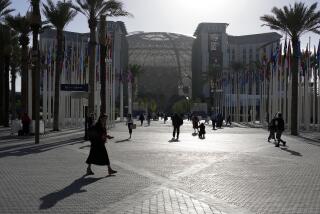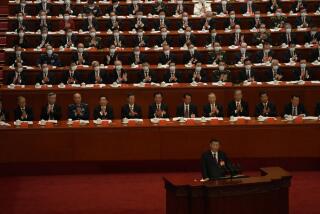China Has Put U.N. Convention at Risk, Groups Warn : Asia: Beijing is trying to segregate official delegates to women’s conference by moving activists at a parallel forum to an isolated site, critics say.
- Share via
HUAIROU, China — A billboard at the Dragon Mountain Hotel urges crews building a new VIP center to “Work hard for 100 days to welcome the Women’s Forum.”
Other banners and signs across this sleepy, broad-laned city 40 miles north of Beijing in the shadow of the Great Wall attempt to create a hospitable mood.
“Welcome to scenic Huairou and expect everything to turn out as you wish,” one said.
But a delegation of leaders of prominent international women’s organizations visited here recently and wished they could be back in this nation’s capital--or perhaps even in another country.
In a highly controversial move that threatens to scuttle an important international women’s conference, the Chinese government last month designated this dusty former garrison town as the venue for a global convention of non-governmental organizations, the NGO Forum on Women, which is to occur Aug. 30-Sept. 8, parallel to the high-profile U.N. International Conference on Women, in Beijing.
The government said the move was necessary because the original site for the forum--the Workers’ Stadium complex in central Beijing--was structurally unsafe.
But women’s groups and supporting governments argue that this was a clumsy effort by the Chinese to segregate 20,000 to 30,000 non-government delegates--many representing ideas unpalatable to the Chinese regime--from official U.N. delegates, international journalists and the Chinese people.
After visiting Huairou earlier this month, NGO forum organizers rejected the site and demanded that the Chinese come up with another setting, preferably closer to the U.N. conference site in Beijing.
The European Union and other countries--including Australia, New Zealand and Canada--have joined in the protest.
A key NGO forum committee is to meet today to discuss a course of action if the Chinese do not find a new site. Among the options: picketing of Chinese embassies and a concerted effort by women’s groups to move the U.N. meeting to another country.
The International Women’s Tribune Center in New York--an important member of the NGO forum--described Huairou as “woefully inadequate for an event of such magnitude.”
The Women’s Tribune Center accused the Chinese of excluding certain non-government groups, including “Tibetan and Taiwanese women, human rights groups, lesbian groups and local Chinese groups.”
So far, the Chinese government has not responded to protests and demands by the NGO forum, which wants its representatives closer to the U.N. event so they can meet with and lobby official delegates.
Forum organizers have asked U.N. Secretary General Boutros Boutros-Ghali to intervene on their behalf.
The U.N. conference itself is in danger of being canceled or, more likely, transferred to another country.
“Right now, the Chinese are offering a Hobson’s choice,” said a Western diplomat in Beijing. “It’s either Huairou or nothing.”
But other diplomats detect room to negotiate.
So far, for example, the Chinese have made little attempt to defend Huairou in their official press.
Part of the problem is the government’s ambivalence about whether even to host the U.N. women’s conference.
The event is certain to focus world attention on Chinese human rights abuses and expose the Chinese people to thousands of independent, freethinking women.
Besides the non-government representatives and 10,000 official delegates, an estimated 5,000 journalists are expected to attend.
When China first bid to host the women’s conference in 1990, the government saw it as a means--along with an (unsuccessful) effort to host the 2000 Olympic Games--to restore this country’s global prestige after the bloody June 4, 1989, army crackdown on pro-democracy demonstrators in the capital’s Tian An Men Square.
But since then, China has seen its international status rise, largely because of its booming economy. Meanwhile, it finds itself in a fragile political mood as it prepares for the leadership succession to ailing 90-year-old leader Deng Xiaoping.
More recently, the host city of Beijing has been embroiled in a tense corruption scandal involving several leaders responsible for dealing with the women’s conference.
A deputy mayor of Beijing involved in planning the conference committed suicide during the corruption probe; another official, Beijing Communist Party leader Chen Xitong, was forced to resign and is reportedly under house arrest.
In short, what seemed an attractive way to win world recognition now represents to Chinese officials a potential political nightmare.
Meantime, Huairou’s shortcomings are clear to any visitor who makes the hourlong drive north.
The city has only a handful of mostly second-rate hotels. As a result, many delegates will be asked to stay in a still-unconstructed tent city in the peak of late summer when temperatures can exceed 90 degrees.
Meeting halls, communications facilities and transportation are lacking. The main meeting hall, a 1,700-seat converted movie theater, is still under renovation.
More to Read
Sign up for Essential California
The most important California stories and recommendations in your inbox every morning.
You may occasionally receive promotional content from the Los Angeles Times.










